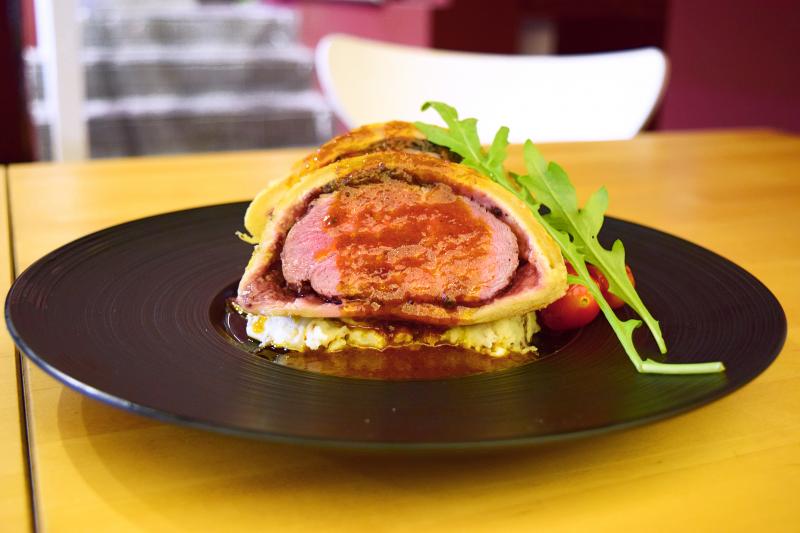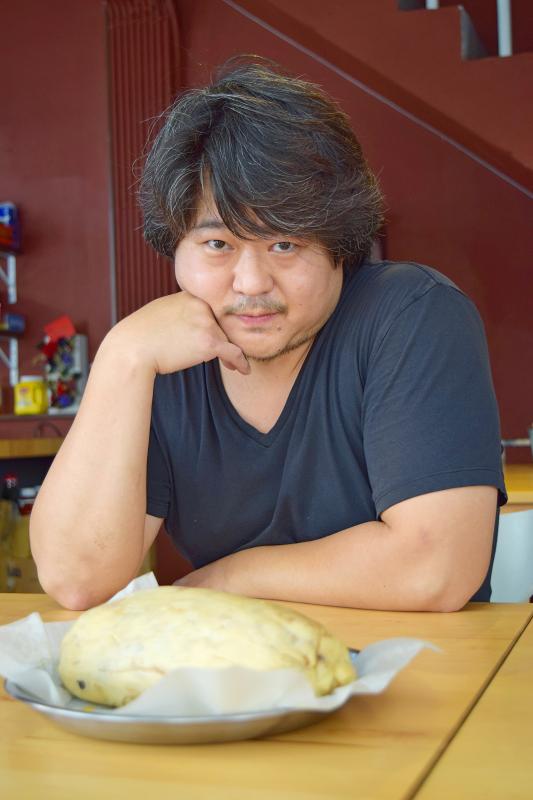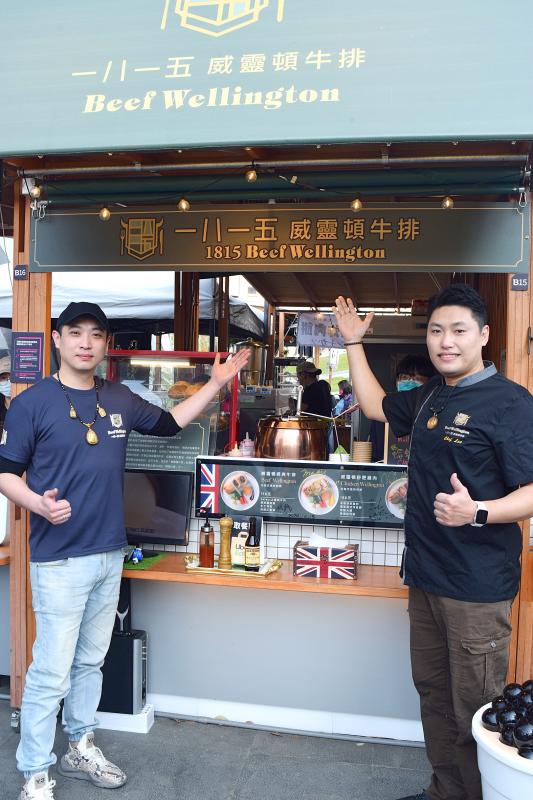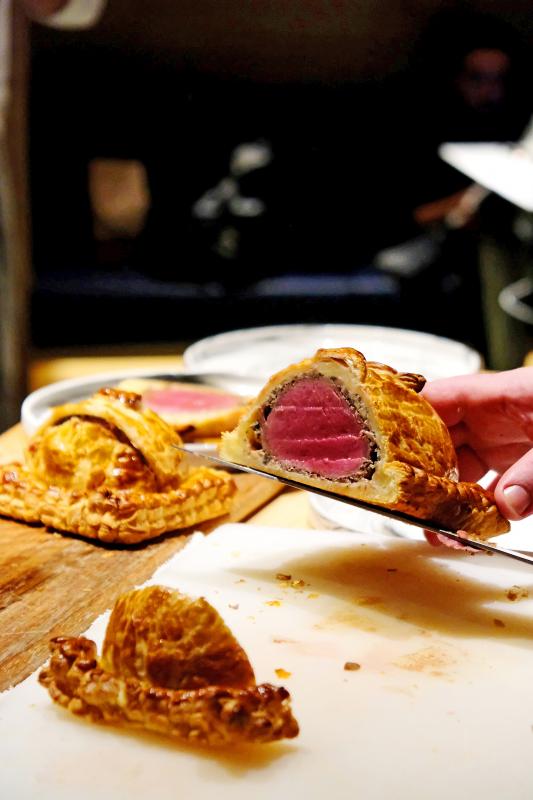Take a filet mignon and smother it in a mixture of thyme, shallots and chestnut mushrooms. Add a layer of prosciutto and finally wrap it up in a blanket of puff pastry.
It’s a classic recipe for beef Wellington, a holiday showstopper at upscale restaurants from New York to London.
But what started in England 200 years ago, has crept its way into Taiwan’s culinary scene. From high-end restaurants in Taipei to night markets in Taichung, beef Wellington is on the menu.

Photo: John Evans
“Customers are really curious about beef Wellington,” said Daniel Yang (楊士儀), chef and owner of Taichung’s Just Diner. “Some have never heard of it. Others saw it on Gordon Ramsay’s show.”
At Yang’s open-air restaurant, customers need to pre-order the beef Wellington, which features a 10oz cut of filet mignon. Yang hopes to sell 50 servings per week, roughly five times the amount he currently sells at NT$820 apiece.
Yang, who grew up in California and immigrated to Taiwan in 2010, aims to move beef Wellington off the holiday menu and on to the daily menu.

Photo: John Evans
The inspiration for the dish initially came from a visit to Daniel Boulud’s Michelin-starred restaurant in New York, where Yang paid US$100 for an immaculate beef Wellington. Then after watching celebrity chef Ramsay cook it on his Hell’s Kitchen show, he was hooked.
DIFFICULT DISH
“Beef Wellington is really a test of knowledge and experience. A lot can go wrong,” said Yang, rattling off a list of common mistakes.

Photo: John Evans
Because the meat is tucked inside a pastry shell, it can easily be overcooked. The fickle dish can also falter from a crumbly pastry shell. And then there’s the mushroom puree, that if too wet will result in an inedible, mushy mess.
On a recent Friday night, the informal atmosphere at Just Diner was perfect for Muto Chuang (莊元武) and his four friends. The party sipped local whiskey and split an order of beef Wellington on the sidewalk dining area.
“I think it’s great that you can enjoy beef Wellington not just at high-end restaurants,” Chuang said. “It’s not only affordable, but it has tender meat and a beautiful sauce.”

Photo courtesy of Leslie Liu
A fan of Ramsay’s curt and direct style, Chuang said he dreams of visiting Hong Kong to have beef Wellington at one of the chef’s restaurants.
Taipei-based food blogger Leslie Liu (劉宥汝) echoes Yang’s observation that when locals think of beef Wellington, they think of Gordon Ramsay.
Liu says the perfect beef Wellington has a flaky crust and a juicy steak tucked inside.
“It’s very eye-catching,” said Liu, whose 136,000 Instagram followers view her friendly restaurant reviews.
The difference between a good beef Wellington and bad one is remarkable, said Liu, who gave high marks to the one at T. R Bar & Kitchen, Hotel Indigo’s in-house restaurant in Taipei. Pre-order is needed and it costs nearly NT$4,000.
Playing up the cool factor is 1815 Beef Wellington, a night market stand in Taichung. The 1815 date is a reference to the dish’s supposed origins, named after the Duke of Wellington’s victory in the Battle of Waterloo in that year.
A loop of celebrity chef Ramsay in the kitchen plays on a screen near the food stand’s menu. In the video he calls beef Wellington the ultimate indulgence.
“People are really surprised you can make high-end food into night market food,” said chef Lee Hong-ru (李鴻儒). The slimmed-down night market version goes for NT$198, with chicken and salmon versions also available. There are even plans for a vegetarian, bean-based Wellington in the future.
Customers’ curiosity seems piqued, with nearly 500 plates of beef Wellington served weekly between the food stands’ two locations.
After first hearing of beef Wellington from watching a YouTube video, Debbie Yang (楊宇瑄) was hooked.
“I think it’s delicious,” said Yang, a frequent customer, who ordered the salmon version to go one recent evening.
LOCAL TREND
Young and curious customers such as Yang are helping to make beef Wellington cool, with several restaurants offering up their new versions. And the popularity isn’t limited to only trendy establishments.
Late last year, Pizza Hut in Taiwan put out their deconstructed version of beef Wellington. Priced at NT$719, a large pizza featured mashed potatoes, beef cubes, puff pastry, cheese balls and other non-traditional ingredients.
Even IKEA’s cafeteria-style restaurants got caught up in the trend last year, offering a plate of beef Wellington with vegetables for NT$380.
And to further bring the dish to the masses, there are even plans to roll out a beef Wellington food truck, said Kelvin Lin (林鑫男), owner of 1815 Beef Wellington.
“We want to make beef Wellington more affordable to everyday customers,” said Lin, but added that delivering on both taste and price is really tricky.
Before opening their food stands last year, Lin and chef Lee tried simple to elegant versions throughout Taiwan, paying top dollar at one high-end restaurant in Taipei.
But once back in their Taichung test kitchen, they tried making a more affordable, convenient kind for the night market. Gone was the flaky puff pastry, replaced with a more bread-like outer layer.
Throughout a week experimenting, failures outpaced successes. But after 100 or so attempts, the owner and chef were satisfied.
“Our friends were all crowded around and they couldn’t stop eating it,” Lee said. “And I said, ‘Finally!’”
What local beef Wellington chefs seem to agree on is that making the signature dish is time consuming and tricky, but definitely worth the effort when done right.
“I’m making it because I love it,” said Yang of Just Diner. “I’m not going with the trend.”
At Just Diner and other restaurants, beef Wellington is served with mashed potatoes and seasoned vegetables. Pair it with a glass of merlot, Yang suggested.
Whether it’s fine dining with linen tablecloths or sidewalk seating next to a busy street, beef Wellington seems to have found a home in Taiwan — at least for now. As with other food trends that come and go, beef Wellington’s popularity in the future remains to be seen.
Things are always changing, said Liu, the Taipei food blogger. What’s popular today, may not be so six months from now.
“Beef Wellington will still be here,” Liu said, “but without all the hype.”

April 14 to April 20 In March 1947, Sising Katadrepan urged the government to drop the “high mountain people” (高山族) designation for Indigenous Taiwanese and refer to them as “Taiwan people” (台灣族). He considered the term derogatory, arguing that it made them sound like animals. The Taiwan Provincial Government agreed to stop using the term, stating that Indigenous Taiwanese suffered all sorts of discrimination and oppression under the Japanese and were forced to live in the mountains as outsiders to society. Now, under the new regime, they would be seen as equals, thus they should be henceforth

Last week, the the National Immigration Agency (NIA) told the legislature that more than 10,000 naturalized Taiwanese citizens from the People’s Republic of China (PRC) risked having their citizenship revoked if they failed to provide proof that they had renounced their Chinese household registration within the next three months. Renunciation is required under the Act Governing Relations Between the People of the Taiwan Area and the Mainland Area (臺灣地區與大陸地區人民關係條例), as amended in 2004, though it was only a legal requirement after 2000. Prior to that, it had been only an administrative requirement since the Nationality Act (國籍法) was established in

Three big changes have transformed the landscape of Taiwan’s local patronage factions: Increasing Democratic Progressive Party (DPP) involvement, rising new factions and the Chinese Nationalist Party’s (KMT) significantly weakened control. GREEN FACTIONS It is said that “south of the Zhuoshui River (濁水溪), there is no blue-green divide,” meaning that from Yunlin County south there is no difference between KMT and DPP politicians. This is not always true, but there is more than a grain of truth to it. Traditionally, DPP factions are viewed as national entities, with their primary function to secure plum positions in the party and government. This is not unusual

US President Donald Trump’s bid to take back control of the Panama Canal has put his counterpart Jose Raul Mulino in a difficult position and revived fears in the Central American country that US military bases will return. After Trump vowed to reclaim the interoceanic waterway from Chinese influence, US Defense Secretary Pete Hegseth signed an agreement with the Mulino administration last week for the US to deploy troops in areas adjacent to the canal. For more than two decades, after handing over control of the strategically vital waterway to Panama in 1999 and dismantling the bases that protected it, Washington has